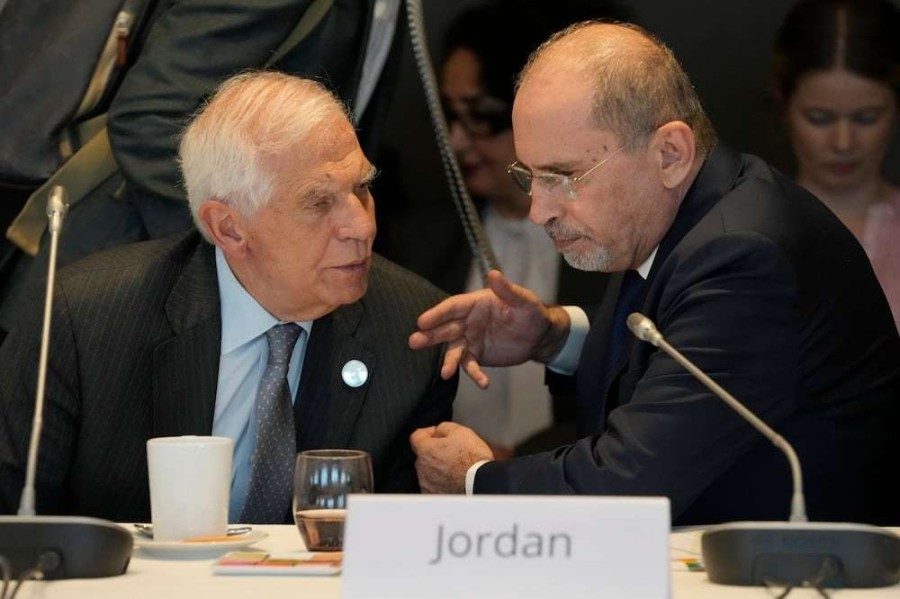Europe under pressure to encourage 'voluntary' return of Syrian refugees

Dozens of Lebanese protesters carrying banners hostile to the presence of Syrian refugees in their country gathered in Brussels during an annual meeting dedicated to the Syrian conflict, as pressure increases on the EU to support the return of those who fled from the war.
The bloc has pledged more than €2 billion ($2.17 billion) to support Syrians across the region and dismissed any talk of their possible return, despite calls from member states to discuss safe zones.
The EU has for years said conditions for a safe and dignified return for Syrians have not yet been met by the government of President Bashar Al Assad, which was responsible for a crackdown on protests in 2011 and led to the civil war.
But host countries, including Lebanon and Jordan, as well as some EU member states, say the burden of Syrian refugees is too heavy and are increasingly calling for the bloc to push for voluntary returns.
Such calls are reiterated forcefully every year around the time of the Brussels conference to support Syria and the region. “You can't have the same discourse for 13 years. It's spinning out
“The best solution is to stop all financial help for Syrians in Lebanon for them to return to Syria,” Mr Bou Assi, a member of the Christian Lebanese Forces political party, told The National.
The crowd around him chanted slogans calling on the EU to “leave Lebanon alone”.
“You fight illegal immigration in your countries. We're doing the same,” read one banner at the protest.
For years, Lebanese politicians have been making similar demands but little has been done as Mr Al Assad remains in power. The main UN-supervised peace process has been frozen since 2017.
EU foreign policy chief Josep Borrell said UN Security Council Resolution 2254, which called in 2015 for a political transition, was the only possible path forward.
But Mr Borrell admitted that it was going nowhere "due to the intolerable obstruction of the Assad regime".
He asked regional partners to "use their political leverage to encourage a renewed impetus on the political process".
"Voluntary returns means voluntary," he said at a media conference. "Refugees should not be pushed back to Syria.
"We should not look to the other side when this happens, and we should not incentivise it by any means.
"We consider that there is not a safe, voluntary, informed and dignified return of refugees to Syria at the time being."
Meanwhile, forced returns of Syrian refugees by Lebanese authorities have increased, with human rights organisations warning of unlawful deportations and mistreatment before they are sent to Syria, where they could be forced into military conscription, or subject to arbitrary arrest.
A recent life imprisonment sentence by a Paris court for three senior officials, including an adviser to Mr Al Assad, for involvement in war crimes and crimes against humanity highlighted the pervasive use of torture in detention centres.
In the latest UN Syrian refugee perception survey, only about 1 per cent of respondents said they intended to go back to Syria in the next year.
The main reason was the lack of employment and livelihood opportunities. More than 90 per cent of Syrians live under the poverty line in their homeland, the UN estimates.
As the conflict enters its 14th year, donations from countries supporting UN programmes for Syrian refugees have decreased as other global conflicts have emerged, including in Ukraine.
UN officials have warned this will lead to more departures from the EU.
'More effective' management of Syrian refugees
“We feel that refugees are being abandoned. Host countries are being abandoned,” said Jordan’s Foreign Minister Ayman Safadi, as he arrived for meetings with EU officials in Brussels.
“Unless the international community shoulders its responsibility, there will be a decrease in services and more suffering for refugees.
“Refugee issues can only be solved by them going back to their country. We need to focus more on creating conditions conducive for their voluntary return.”
The EU showed a renewed interest in Syrian refugees in Lebanon after complaints by member state Cyprus following a recent increase in arrivals of Syrians by boat from Lebanon.
Estimated at 30,000, the total number of Syrians in Cyprus, which has a population of about 900,000 outside the Turkish-controlled area of the Island, pales in comparison to some of Syria's neighbouring countries.
At close to 780,000, according to the UN, the number of Syrians in Lebanon represents roughly a fifth of the country's population. Local authorities believes figures are higher, closer to 2 million, due to unregistered migrants.
More than 5 million Syrians live as refugees outside their home country.
President of the European Commission Ursula von der Leyen this month announced a €1 billion package for Lebanon.
The exact details of the disbursement of the funds, intended to support basic services, border management, and the Lebanese army, remain unclear.
Cyprus has called for establishing “safe zones” in Syria and for “realistic measures to manage migration more effectively".
Nicosia this month invited seven other EU countries including the Czech Republic, Poland, Italy and Austria, to discuss “migration and Syria dynamics”.
In a speech in Beirut, Ms von der Leyen appeared to open the door to discussions on returns.
“We will also look at how we can make the EU's assistance more effective. This includes exploring how to work on a more structured approach to voluntary returns to Syria, in close co-operation with UNHCR,” she said.
Speaking ahead of the Syria donor conference, an EU official said that language on the conflict was unlikely to change any time soon.
“Again, we think the conditions for returns to Syria are not met,” they said. “It's up to Syria to create conditions for return.”
